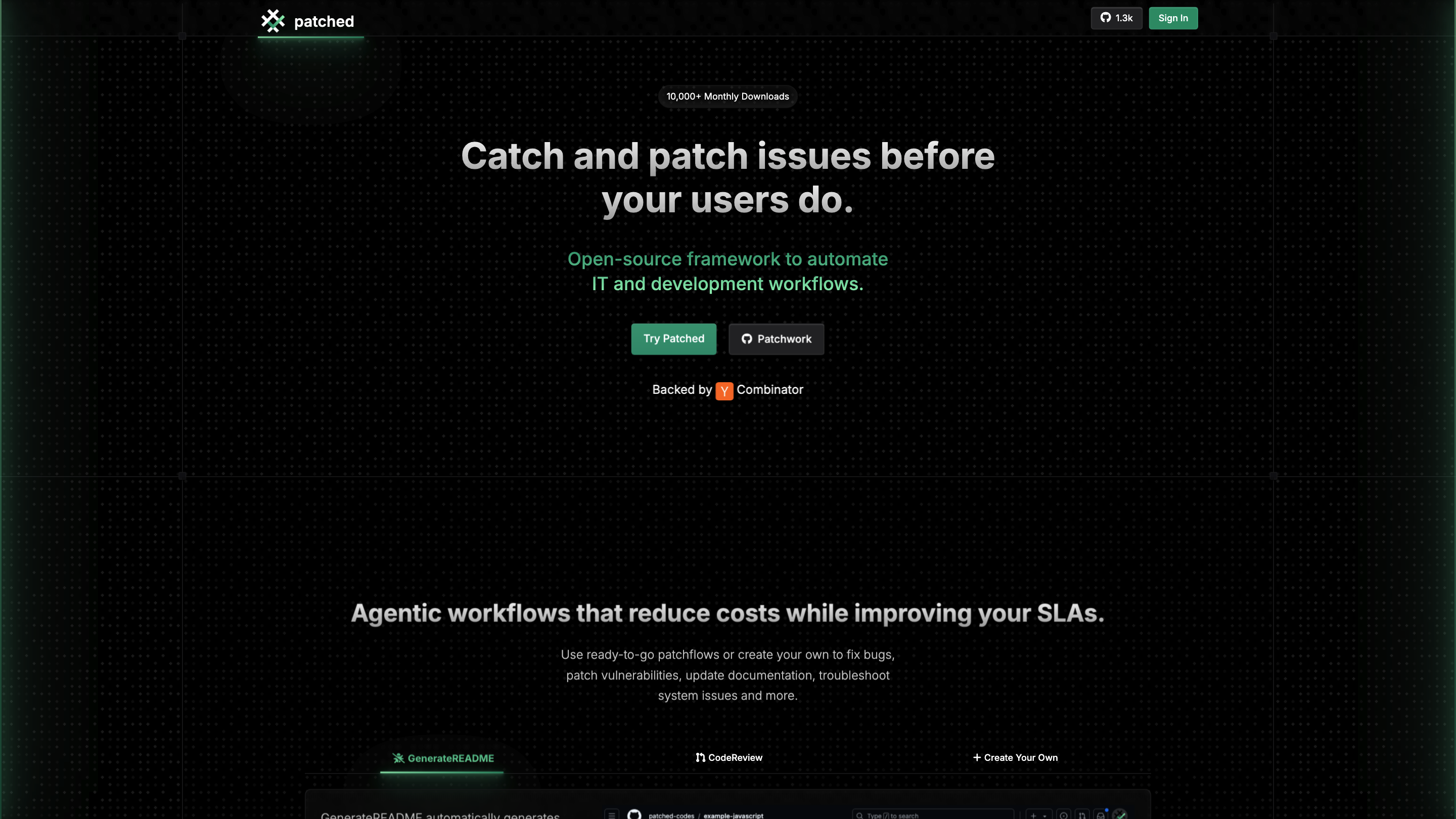Patched
Open siteIntroduction
Open-source automation for dev teams to streamline workflows.
Patched Product Information
Patched / Patchwork: Automated Dev Workflows for IT and Software Projects
Patched is a managed service that lets you use Patchwork, an open-source Python framework, to automate mundane development tasks such as reviews, documentation, patching, vulnerability fixes, and more. It runs behind the scenes to optimize prompts and inferences, providing a GUI, a workflow builder, and performance improvements over frontier models for supported tasks.
Key capabilities include generating README documentation from a repository, automatically reviewing and triaging pull requests, upgrading vulnerable dependencies, and enabling you to build your own patchflows either with code or a no-code builder. Patchwork can be deployed with your own LLM API keys for privacy, and integrates with major SDLC tools.
How to Use Patched / Patchwork
- Get started: Click Get Started in the Patched UI or follow the GitHub instructions to use the CLI.
- Choose a workflow: Use ready-to-go patchflows or design your own from scratch (no-code builder or code-based).
- Configure integrations: Connect your LLM provider and integrate with GitHub, GitLab, Jira, Hugging Face, AWS, Anthropic, Semgrep, SonarQube, OpenAI, Mistral, Bitbucket, and more.
- Run and monitor: Execute patchflows to automate tasks like reviews, documentation, vulnerability patching, and dependency upgrades. Review outputs and iterate as needed.
Disclaimer: Patched is a developer-focused automation tool intended to reduce repetitive tasks and improve code quality. Users should review automated results before merging or deploying.
Patchwork Core Capabilities
- Build AI-assisted workflows that automate reviews, docs, patching, triage, and more
- Create patchflows using text prompts, visual builders, or Python code
- Run Patchwork locally or in your own infrastructure with your own LLM API keys for privacy
- Free and Open Source Patchwork: use, modify, and deploy for free
- Integrations with GitHub, GitLab, Jira, Hugging Face, AWS, Anthropic, OpenAI, Mistral, Bitbucket, Semgrep, SonarQube, and more
- Pricing: Usage-based plans including Free, Pro, and Enterprise options
- Cross-platform accessibility with a GUI, CLI, and GitHub Actions support
- Patch Vulnerabilities, Upgrade Dependencies, Analyze Pull Requests, Generate Documentation, Triage Issues, Create Tickets, and more
How Patched Differs from Other Tools
- Fully customizable: tailor patchflows to your exact needs or use the no-code builder for rapid composition
- Privacy-first: deploy patchwork in your own infrastructure with your own LLM keys
- Free and Open Source: Patched’s Patchwork framework is open source and free to use
- Deep integration: connects with major development tools to seamlessly fit into existing workflows
Safety and Best Practices
- Use automated outputs as guidance; always review changes for correctness and potential security implications before applying patches or merging PRs.
- Maintain proper access controls for LLM keys and integration credentials.
Core Features
- Fully customizable patchflows: build with code, no-code, or a mix
- Privacy-first deployment: run with your own LLM API keys
- Open-source Patchwork framework: free to use and contribute to
- Rich integrations with GitHub, GitLab, Jira, Hugging Face, AWS, Anthropic, OpenAI, Mistral, Bitbucket, Semgrep, SonarQube, and more
- Automate tasks: PR reviews, documentation generation, vulnerability patching, dependency upgrades, triage, and ticket creation
- Generate README files automatically from repository content
- CLI and GUI support, plus GitHub Actions integration
- Flexible pricing: Free tier plus Pro and Enterprise options
